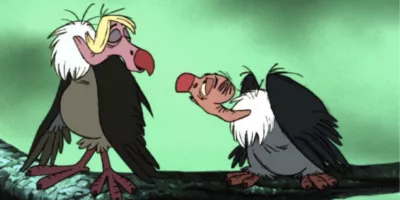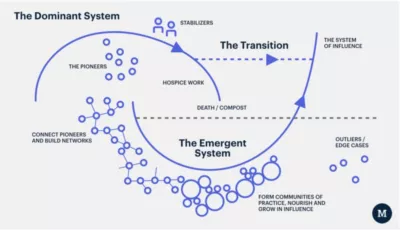19 Oct 2023
What are we gonna do?

Instead of being daunted by wicked problems like the climate crisis, let’s trust the process.
-
Stu Charlton
Strategic Director

I’ve written before about solving knotty problems. Knotty problems are my favourite kind. When you approach one it’s not clear how to solve it. They’re satisfying because of the journey – you have to trust the process. Anything less tangly doesn’t seem worth bothering with.
But wait have you heard about wicked problems? Wicked problems have “many interdependent factors making them seem impossible to solve”, according to the Interaction Design Foundation.
Because the factors are often incomplete, in flux, and difficult to define, solving wicked problems requires a deep understanding of the stakeholders involved, and an innovative approach provided by design thinking.
It’s easy to feel powerless in the face of wicked problems. That’s one reason why a lot of us who ought to do more to address the climate crisis instead succumb to Yak Shaving or – worse – Oh Dearism.
Last week I went to the Blue Earth Summit: “Two days of inspiration and action forging a closer connection to the natural world for those who want to live and work more sustainably”.
It was inspiring as advertised. And a bit overwhelming. But that’s just how it goes with wicked problems – you have to throw yourself into them. You have live with the uncertainty of it all, to be professionally vulnerable by revealing that you aren’t sure what to do. It’s an uncomfortable place to be if you’ve developed a reputation for being an expert, for knowing things. Not now, egos.
It’s also uncomfortable if you feel dependent on the system that created this mess. Let’s imagine that you’re partly responsible for the commercial success of a consultancy that has employees whose salaries pay for their rent or mortgages and whose market includes profit-seeking businesses with shareholders to satisfy.
Now let’s imagine that you wander semi-deliberately into a workshop about the death of that system.

The Burkana Two-Loops model describes dying systems being replaced.
Honestly, it makes sense. Maybe this is what we need. And yet, my brain screams, who will pay the mortgages! As the American ‘muckraker’ and Democratic Party nominee for governor of California, Upton Sinclair, allegedly put it:
It is difficult to get a man to understand something when his salary depends upon his not understanding it.
That’s the climate crisis right there.
There were, it has to be said, a few corporate platitudes to be heard droning from the main stage. But mostly I heard lively critical discussion among genuinely optimistic, energetic, open-minded people. Some ideas – such as the Burkana Two-Loops model – seemed pretty leftfield at first, then less so when I managed to drop my biases for a minute.
Big cheese financiers responded earnestly when challenged about limited supply chain data that reveals nothing about exploitation in the global south.
The most famous and mainstream member of the Blue Earth ‘relentless positivity’ brigade was Deborah Meaden, who – unsurprisingly for a Dragon – thinks that governments are too slow and therefore businesses have to lead.
Most of all, she seemed upbeat, undeterred by the uncertainty of it all. We need role models like that. We can be like that!
There’s a lot to do. But there are also clear places to focus now.
We’re helping the commercial arm of a tier-one bank to improve the tool that it provides to help SMEs get to net zero. Its research suggests that around 90% of organisations are yet to begin their net-zero journey. We can do something about that!
Instead of being daunted by wicked problems, let’s look again at this definition:
Solving wicked problems requires a deep understanding of the stakeholders involved, and an innovative approach provided by design thinking.
We have the tools, we have the motivation. Let’s trust the process. Where next?


